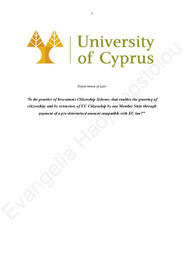Is the practice of Investment Citizenship Scheme, that enables the granting of citizenship, and by extension, of EU Citizenship by one Member State through payment of a pre-determined amount compatible with EU law?

View/
Date
2021Author
Hadjiapostolou, EvangeliaAdvisor
Vlachou, CharikleiaPublisher
Πανεπιστήμιο Κύπρου, Σχολή Κοινωνικών Επιστημών και Επιστημών Αγωγής / University of Cyprus, Faculty of Social Sciences and EducationPlace of publication
CyprusGoogle Scholar check
Metadata
Show full item recordAbstract
Αυτή η διατριβή εξετάζει εάν τα συστήματα χορήγησης ιθαγένειας σε επενδυτές που είναι γνωστά ως «χρυσά διαβατήρια» είναι συμβατά με το δίκαιο της Ευρωπαϊκής Ένωσης (ΕΕ) εξετάζοντας συστήματα διαφορετικών κρατών μελών, ιδίως της Βουλγαρίας, Μάλτας και Κύπρου. Πρώτον, η παρούσα διατριβή αναλύει την έννοια της ιθαγένειας της ΕΕ και την σχέση της με την ιθαγένεια των κρατών μελών. Συζητά επίσης τους περιορισμούς που επιβάλλονται στα κράτη σχετικά με την απόκτηση και την απώλεια της ιθαγένειας από την οπτική της ΕΕ. Επιπλέον παρουσιάζει τους διαφορετικούς τρόπους απόκτησης της ιθαγένειας. Η παρούσα διατριβή αναλύει την ιστορική εξέλιξη των συνθηκών που απαιτούνται από τα τρία κράτη μέλη (Βουλγαρία, Μάλτα και Κύπρο), για την απονομή της ιθαγένειας της ΕΕ. Τέλος, η παρούσα διατριβή εξετάζει τις παραβιάσεις που έγιναν μέσω της λειτουργίας του εν λόγω συστήματος απόκτησης ιθαγένειας. Ιδιαίτερη έμφαση δίνεται στην πολιτογράφηση επενδυτών στο πλαίσιο του κυπριακού συστήματος. Παρουσιάζει επίσης τη θέση της ΕΕ και ειδικότερα τον τρόπο αντίδρασης στις παραβάσεις. Η παρούσα διατριβή υπογραμμίζει τη σημασία της εισαγωγής αυστηρών ελέγχων στους αιτούντες από τα κράτη μέλη για να διασφαλιστεί ότι τα συστήματα λειτουργούν με τα υψηλότερα πρότυπα διαφάνειας και ακεραιότητας και ότι η αρχή της ειλικρινούς συνεργασίας, όπως ορίζεται στο άρθρο 4(3) της Συνθήκης για ΕΕ, είναι απολύτως σεβαστή. This dissertation examines whether the Investor Citizenship Schemes (‘ICS’) known as “golden passports” are compatible with the European Union (‘EU’) law by asserting different Member States’ schemes, in particular of Bulgaria,Malta and Cyprus. Firstly, this dissertation analyses the concept of the EU citizenship and its relations with the nationality of Member States. It also discusses the restriction imposed on Member States regarding the acquisition and loss of nationality from the EU perspective. Furthermore, it presenta the different modes of acquisition citizenship. This dissertation analyses the historical evolution of conditions required by the three Member States (Bulgaria, Malta and Cyprus), to award EU citizenship.Finally, this dissertation examines the violations that took place through the operations of the ICS. Particular emphasis is placed on the naturalisation of investors under the Cypriot ICS. It also presents the position of the European Commission and in particular, the way reacted to violations. This dissertation highlights the importance of the introduction of rigorous checks on applicants by the Member States to ensure that the schemes operate with the highest standard of transparency and integrity and the principle of sincere cooperation as stated in Article 4(3) of the Treaty on European Union, is fully respected.
